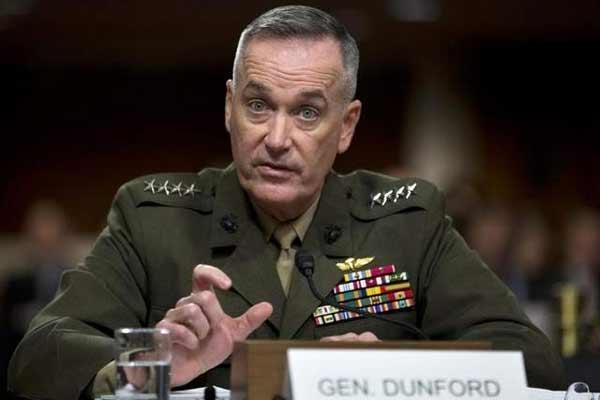The nature of warfare is changing, and that may require a new staff that can coordinate U.S. military response across regions and domains, the chairman of the Joint Chiefs of Staff said Monday.
At a Washington, D.C. forum organized by the Center for a New American Security, Gen. Joseph Dunford said the current fight against Islamic State militants highlighted the changing quality of global threats and military challenges.
The issue at "the top of my inbox," he said, was how to adjust the traditional response of the Joint Staff and the combatant commanders to adapt to the nature of today's conflicts.
"Any conflict we have will be transregional, multi-domain and multi-functional," Dunford said, adding that factors including information operations, cyber capabilities and ballistic missile technology had all altered and broadened the scope of the modern battlefield.
"If you were to talk about the Korean Peninsula some years ago, you would have thought about a conflict that we hoped to isolate on the Korean Peninsula," he said. "And then as the North Koreans developed ballistic missile capability, it started to affect other regional actors, such as Japan, so no longer could you hope to isolate a conflict on the peninsula."
Dunford said a new, dedicated staff likely needed to be created that could absorb the perspective of all the U.S. geographic combatant commanders around the world and provide the defense secretary with a complete operational picture involving multiple regions. That's not how the Joint Staff currently operates, he said.
"Quite honestly, the lowest level of integration in the Department of Defense really is the secretary of Defense," Dunford said.
With upcoming House and Senate Armed Services Committee hearings to review 1986 Goldwater-Nichols Act, which dictates how the current military chain of command functions and describes the role of the service chiefs, Dunford said there would be opportunity to discuss the proposal further.
Meanwhile, he said, he was making more minor adjustments within his authority as chairman to encourage the sort of transregional collaboration that he said would make the U.S. successful in addressing the global threats of today.
"If you look at the nature of the fight against violent extremism, and then look at the nature of what the fight might be against peer competitors in the future, I don't think we'll be as responsive, I don't think we'll generate the tempo, I don't think we'll be able to frame decisions and act in a timely manner as much as we should unless we make some fundamental changes again to our organizational construct, the way we plan the way we develop strategy and then as importantly our command and control," he said.
-- Hope Hodge Seck can be reached at hope.seck@military.com. Follow her on Twitter at @HopeSeck.






























